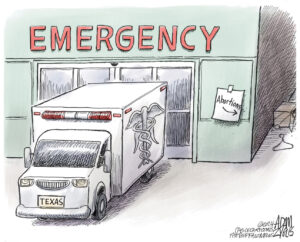Attorney in Supreme Court Abortion Battle Outlines Just What’s at Stake
As the Supreme Court considers its stance on the contentious Texas law, Stephanie Toti, senior counsel at the Center for Reproductive Rights, weighs in on how it has affected women’s health care. 1 2
During the trial, there was evidence that the Texas Department of Health had been receiving hospital reports about women with complications from self-induced abortions. One hospital reached out to the department and asked, “Are we supposed to report these as we would from complications from any other abortion?” because Texas laws require that any doctor who treats an abortion complication report it to the state so the state can generate statistics about those complications. The health department said, “No, we don’t want to know about this. Don’t report it.” Not only is this occurring, but state authorities are turning a blind eye to it.
Women and girls also have to deal with misinformation. A recent study led by Rutgers political science professor Cynthia Daniels analyzed statements about embryological and fetal development from booklets produced by 23 states that require informed consent. It found that women and girls are getting medically inaccurate information nearly a third of the time. In other words, doctors and health care providers must lie. How is this legal?
It’s not legal. The Supreme Court has said that states can require doctors to give certain information about abortion if the information is truthful and not misleading, but many states require doctors to provide information that’s both untruthful and ideological in nature. There’s such a proliferation of these laws that it’s difficult to challenge them all and get them all struck down.
There was a law enacted in South Dakota a couple of years ago that requires abortion providers to tell their patients both that abortion increases the risk of suicidal ideation, which is patently false, and that abortion “terminates the life of a whole unique separate living human being.” It was challenged in court, and the court of appeals that oversees South Dakota upheld it. It was a heartbreaking and maddening decision.
It’s infuriating that doctors around the country are being forced to disseminate misinformation to their patients. There are a lot of caring doctors who say, “I’m required to give you this information, but I need you to know it’s not true, and here’s what you really need to know in order to make an informed decision about your care.”
Dawn Porter, the filmmaker who made the documentary “Trapped,” told me that she’s met women who are in the process of reviving the Jane Collective. The Jane Collective was an underground abortion collective in Chicago, formed in 1969 to ensure women wouldn’t have unsafe and potentially deadly procedures.
I applaud the activism, but as a lawyer, I think it’s a shame that politicians, under the guise of protecting women’s health, are forcing women to leave the health care system in order to get necessary services. That’s the most infuriating thing about these laws. The politicians claim that they’re enacting them to protect women, but all of the available evidence shows that the laws do just the opposite. They provide no medical benefits. Instead, they delay, and in many cases, prevent women from accessing abortion; they force women to try to induce their own abortions or seek care outside the medical system.
Did you think you would ever be arguing such an important case affecting women’s lives?
I started at the Center for Reproductive Rights in late 2006, just before the Supreme Court decision in Gonzales v. Carhart, which was the last big abortion case the court decided. The decision in that case upheld federal law that banned a certain method of performing abortions and really ushered in a new era of abortion regulations. Many states that are hostile to abortion rights looked at that decision and felt empowered to begin enacting increasingly tough and unjustified restrictions. Over the last 10 years, we’ve seen restrictions on access to abortion proliferate, and states adopt new and different strategies, such as dressing up the restrictions as medical requirements.
When I first started, I didn’t know it was going to be such an uphill battle. That 2007 court decision really set us in that direction. I’m hoping when the Supreme Court decides Woman’s Health this year, it will complete that circle, and the court will put us back on a path towards universal recognition of women’s reproductive rights.
The Center for Reproductive Rights has dozens of cases going on right now challenging restrictive abortion laws that prevent women from accessing various kinds of health care.
In the last couple of years, we’ve seen several states enact outright bans on abortion. North Dakota enacted a ban starting at six weeks of pregnancy. Arkansas enacted a ban starting at 12 weeks of pregnancy. We’re able to go to court and get those laws struck down, but it takes time and resources.
Oklahoma is poised to enact a measure to ban all abortions at any state of a pregnancy. This is a tactic that states use, but more than 40 years of precedent, upheld by the Supreme Court, holds that women have a constitutional right to make decisions about their pregnancies. Seven in 10 Americans fully support that right, so politicians and laws that seek to restrict access to abortion are out of step both with the will of the public and with the Constitution.
What advice would you give to young women who are thinking about becoming reproductive rights lawyers?
Go for it, and don’t let anybody tell you that you can’t do it.
A decision is expected soon. How are you preparing?
We are feeling optimistic about the case. We’re hopeful that the Supreme Court will see the Texas laws for the sham that they are and strike them down. We’re also working so that we can seize the public attention that’s focused on the decision to help people understand just how pivotal a moment this is and how abortion rights are under siege in so many parts of the country.
Your support matters…
SUPPORT TRUTHDIG
Independent journalism is under threat and overshadowed by heavily funded mainstream media.
You can help level the playing field. Become a member.
Your tax-deductible contribution keeps us digging beneath the headlines to give you thought-provoking, investigative reporting and analysis that unearths what's really happening- without compromise.
Give today to support our courageous, independent journalists.






You need to be a supporter to comment.
There are currently no responses to this article.
Be the first to respond.